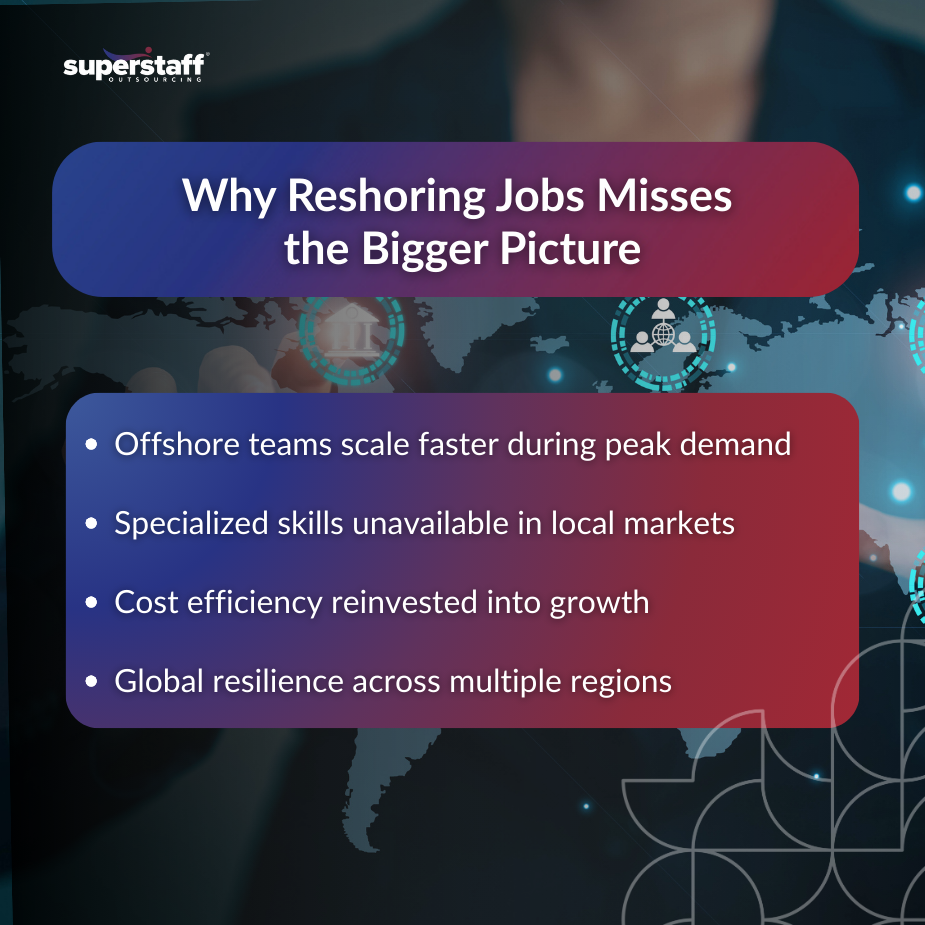
In recent years, the conversation around reshoring jobs has grown louder, often framed as a cure for everything from strained supply chains to domestic employment challenges. Politicians and pundits alike have positioned reshoring as a patriotic fix that promises stability and prosperity.
Yet this debate frequently overlooks the bigger picture. While reshoring captures headlines, businesses that focus only on bringing operations back home risk ignoring the very strategies that have long fueled their global reach. Offshore teams remain the true drivers of agility, scalability, and sustained advantage in a volatile marketplace.
To understand why, business leaders need to look beyond political narratives and assess how offshoring continues to power competitiveness in real, measurable ways.
Reshoring Is More About Politics Than Performance
The push for reshoring jobs is rarely based on operational logic. Instead, it is often propelled by political agendas aimed at satisfying voters who want to see jobs return to domestic markets. The truth is that the economic case for reshoring is significantly weaker than its political appeal. For businesses, the reality is that reshoring typically leads to higher costs without solving structural challenges.
U.S. labor costs are among the highest in the world, and this expense compounds when companies factor in rising real estate prices, energy bills, and domestic tax obligations. By keeping everything in-house, businesses may find themselves burdened with infrastructure costs that limit their ability to scale.
An executive weighing these factors quickly realizes that reshoring jobs creates a false sense of security. It may feel like a win in the short term, but in practice, it restricts innovation and flexibility. Offshore teams allow companies to invest resources where they matter most, rather than tying up capital in costly domestic overhead.
To remain competitive, businesses must think past short-term political narratives and prioritize models that enhance resilience and long-term growth.

Offshore Teams Provide Unmatched Scalability and Flexibility
Offshore teams have consistently proven their ability to deliver scalability that reshoring jobs cannot match. Consider the challenge of customer service demand during peak retail seasons such as the holidays. Domestic teams often struggle to hire and train quickly enough to handle sudden spikes, leading to longer wait times and frustrated customers. Offshore teams, on the other hand, can expand headcount rapidly through established hiring pipelines.
The scalability advantage does not stop with customer service. Businesses in sectors like healthcare, finance, and technology face unpredictable fluctuations in demand, from claims processing surges to IT service requests. Offshore partners in the Philippines and Colombia are designed to adapt quickly, building teams in a matter of weeks rather than months.
This level of flexibility allows companies to stay ahead of competitors who are bogged down by rigid staffing structures. When you compare reshoring vs offshoring, the latter clearly provides the operational agility that modern businesses require. Offshore teams are not just support systems. They are strategic levers that allow companies to pivot faster in changing markets and capitalize on new opportunities without being held back by local labor constraints.
Offshore Markets Fill Critical Skill Gaps
Global competitiveness today hinges on access to specialized skills, and offshore markets have become essential in bridging these gaps. The talent shortages in fields like IT development, data analytics, healthcare support, and multilingual customer experience are well documented. Domestic labor markets often lack both the supply and the affordability required to meet these needs. Offshore talent pools, however, have been cultivated specifically to address these demands.
In the Philippines, for example, professionals are trained to deliver high-quality support in areas ranging from compliance monitoring to AI assistance. The bilingual capabilities of Filipino teams add another dimension, enabling companies to expand their reach into non-English speaking markets without friction. Similarly, Colombia has positioned itself as a nearshore hub for Spanish and English bilingual CX, bridging North American businesses with Latin American consumers seamlessly.
This combination of specialization and cultural adaptability creates a competitive edge. By relying on offshore teams instead of focusing on reshoring jobs, companies unlock access to expertise that cannot be replicated domestically. The conversation is not about local versus global talent but about leveraging the best skill sets wherever they are found to deliver sustainable growth.
Offshore Teams Deliver Cost Efficiency Without Sacrificing Quality
Cost efficiency is another area where offshore teams demonstrate a decisive advantage. Outsourcing allows companies to significantly reduce overhead while maintaining or even improving service quality.
By working with offshore providers, businesses avoid the heavy burden of managing physical facilities, training infrastructure, and operational technology in-house. Offshore partners handle these responsibilities, freeing organizations to focus on strategy and innovation.
The difference becomes even more evident when comparing domestic labor costs with offshore rates. Bringing jobs back domestically may satisfy political narratives, but it drains budgets that could otherwise be invested in product development, customer engagement, or market expansion. Offshore markets like the Philippines combine affordability with a strong service culture, ensuring companies never compromise on quality.
The debate over reshoring vs offshoring tends to ignore this simple fact. Lower costs are not just about saving money. They are about reinvesting in areas that drive growth. Every dollar saved by working with offshore partners can be redirected to initiatives that improve competitiveness, from adopting new technologies to expanding customer offerings. Businesses tied to reshoring jobs often miss out on these reinvestment opportunities, slowing their progress in global markets.
Offshore Teams Strengthen Resilience in Global Operations
Resilience is no longer optional in today’s business climate. The pandemic, trade disputes, and shifting tariffs have underscored how fragile supply chains and single-market dependencies can be. Offshore teams strengthen resilience by diversifying operations across multiple regions.
When businesses operate with distributed teams in the United States, the Philippines, and Colombia, they reduce the risks of localized disruptions. A natural disaster, political upheaval, or economic slowdown in one market does not halt operations entirely. Instead, work can continue seamlessly across other regions, maintaining service continuity for customers and clients.
This approach also helps businesses stay ahead of geopolitical risks. Offshore diversification acts as a shield against shocks like trade wars or tariff hikes. Companies that rely exclusively on reshoring jobs are far more exposed to these risks. Rather than waiting for policy changes to derail operations, companies that leverage offshore teams are prepared to shift workloads and maintain momentum. It is this kind of resilience that ensures businesses remain competitive in global markets, regardless of short-term political debates about reshoring.
SuperStaff Demonstrates Why Offshore Still Wins
At SuperStaff, we have seen firsthand how offshore strategies drive global competitiveness for SMEs and midmarket companies. With over 400 agents across the Philippines and expanding operations in Colombia, we specialize in delivering the type of scalable, resilient, and cost-efficient solutions that reshoring jobs cannot replicate.
Our teams provide 24/7 customer experience coverage without overburdening domestic staff, ensuring businesses can meet the needs of global consumers at any time of day. Beyond customer service, our expertise extends into specialized back-office roles, compliance support, and multilingual communication, creating comprehensive solutions that align with diverse business needs.
What sets SuperStaff apart is not only operational capability but cultural alignment. Our professionals are trained to work seamlessly with U.S. and international businesses, providing a level of service that feels local even when delivered offshore. This blend of technical expertise, cultural adaptability, and operational resilience is what enables our clients to stay competitive in dynamic markets. Offshore solutions are not just an option. They are a necessity for companies that want to thrive in the years ahead, especially in contrast to the limitations of reshoring jobs.
Offshore Teams Still Power Global Competitiveness
The debate around reshoring jobs may dominate headlines, but it misses the fundamental truth. Offshore teams remain the real drivers of global competitiveness. They provide scalability, fill critical skill gaps, ensure cost efficiency, and strengthen resilience in ways reshoring simply cannot match. The impact of reshoring jobs on global competitiveness is often overstated, while the benefits of offshore strategies continue to be proven daily in real business outcomes.
For SMEs and midmarket companies, the choice is clear. Staying competitive requires looking beyond political narratives and investing in global strategies that deliver measurable value. Partnering with SuperStaff gives you access to world-class teams in the Philippines and Colombia, enabling your business to scale, adapt, and succeed in today’s unpredictable economy. The reshoring debate may capture attention, but it is offshore solutions that truly secure the future.






